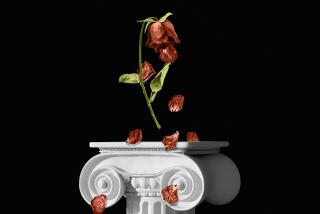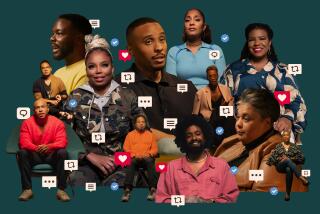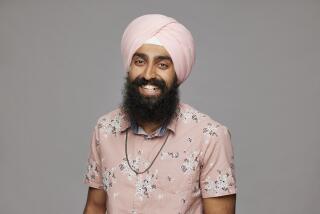The Surviving Brother Is the Message
- Share via
We wear the mask that grins and lies
It hides our cheeks and shades our eyes,
This debt we pay to human guile;
With torn and bleeding hearts we smile
And mouth with myriad subtleties.
*
The African American poet Paul Laurence Dunbar wrote the poem from which this is excerpted in 1895, and while much has changed in black-white relations in the ensuing years, some things remain distressingly the same.
In this case, whether in 1895 or 2000, much of white America prefers its black folks cheerful--or at least without pointed opinions on touchy subjects like race.
The first few lines of Dunbar’s poem kept popping into my mind last week as I, along with a good chunk of the rest of the country, followed the goings-on on two of CBS’ hit reality shows, “Big Brother” and “Survivor.” The two shows differ in that one was set in civilization and one in the wild, but in each, the group being filmed is made up of mostly white men and women who are middle class or aspiring to get there, with a few people of color thrown in to appease the Diversity Gods. Each show has a system of eliminating group members whom the group finds offensive or useless. As each show is constructed, the last person remaining will be awarded a significant amount of money--$1 million in the case of “Survivor,” set on an island in the South Pacific, and $500,000 for “Big Brother,” which takes place on a specially-constructed set somewhere in the San Fernando Valley.
On “Big Brother,” William, the 27-year-old African American house guest (CBS’ preferred term for this oddly cobbled together group starting to look more like inmates) was controversial from the start: He was blunt in his opinions, quick to insult and be insulted and confrontational enough that the rest of the group found his presence divisive and distressing. (And, viewers discovered late in the week, he’d recently been a member of the New Black Panther Party run by Khalid Abdul Muhammad, a former Nation of Islam officer so radioactive even Louis Farrakhan had to dismiss him from the Nation of Islam.)
The house’s sole other black occupant, a well-educated, well-traveled United Nations communications officer named Cassandra, took William, also known as “Mega,” aside several times to warn him that his in-your-face persona would only earn him the chance to be shown to the door. “You’re making people uncomfortable,” she said firmly. William’s response was, “That’s me, I gotta be me.” If he changed that to accommodate his housemates, he argued, “I’d lose my soul.” On Thursday he left, soul intact, because the unvarnished him was too much, both for his housemates and for viewing audience members who paid 99 cents each to phone in and vote him out.
Over on the island, Gervase, also black, male, about William’s age, and from Philadelphia, was watching as his island mates fell. Early on in the series, he cheerfully admits to his off-camera interrogator that he intends to get through the ordeal not on traditional survival skills but by “using my charm.” He smiles while his teammates fish, jokes while they cook, entertains them with his charm while they scavenge and clean up. For some reason, they haven’t found his amiable laziness irritating enough to vote him off the island yet, despite the fact that he’s bringing nothing to their particular party but a huge grin and a happy-go-lucky demeanor.
Is it coincidence that William is gone while Gervase is still around to watch another island sunrise with his castaway mates? A scan of message boards on the Internet shows that most white correspondents and a small number of black ones found William’s persona--his willingness to push the envelope on racial discussions with people he’d only just met--unacceptable. Some blacks who logged on thought he was banished because he’s black, but that’s probably simplistic.
Being black didn’t get William banned, but it probably did exacerbate people’s discomfort with him. Cheerful and black is still more attractive to much of America than serious and black (and certainly more attractive than surly and black). Uncle Ben, Aunt Jemima and the Cream of Wheat chef became beloved icons that were welcomed onto many American household shelves because they were comforting, reassuring images of the black folks in our midst. Suave, smiling Vernon Jordan always will catch more congressional flies than will NAACP scold Kweisi Mfume. Oprah’s National Mommy persona, which occasionally even lapses into dialect, is much more palatable to many than Maxine Waters’ pointed criticisms, delivered with crisp pronunciation.
“It’s not what you say, it’s how you say it,” the old maxim goes. And for many black Americans in predominantly white environments, maybe it’s also who you are--or seem to be--when you’re saying what you say.
More to Read
The complete guide to home viewing
Get Screen Gab for everything about the TV shows and streaming movies everyone’s talking about.
You may occasionally receive promotional content from the Los Angeles Times.






